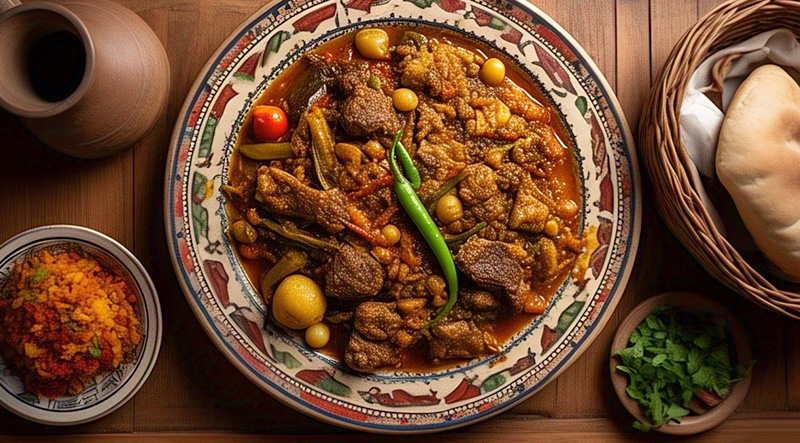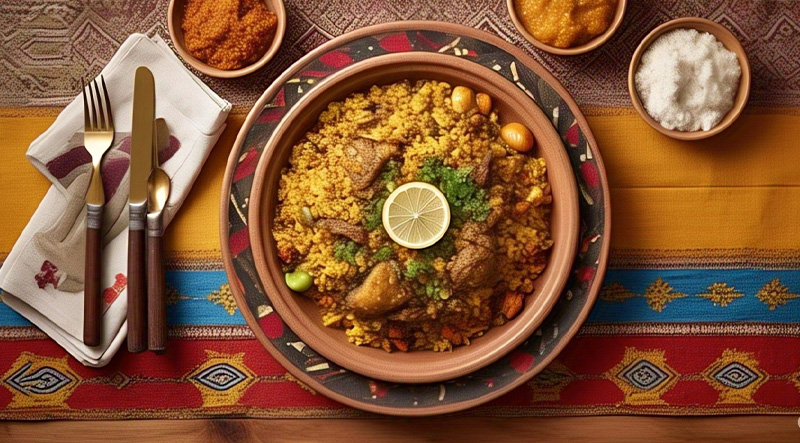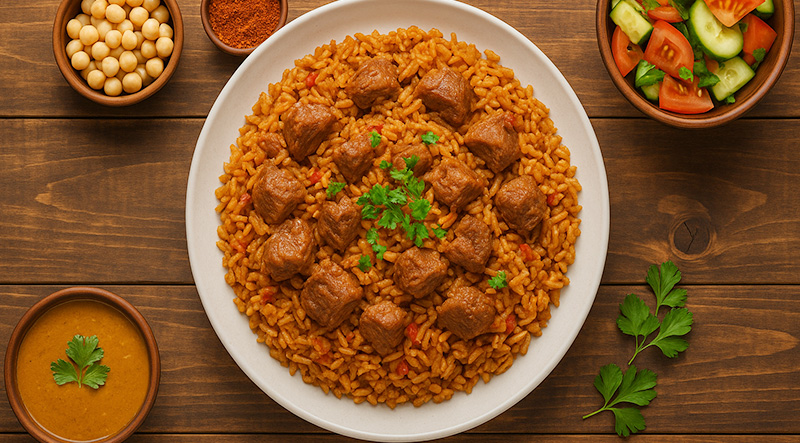Skoudehkaris, Djibouti’s national dish, is a vibrant, flavorful feast that captures the essence of the Horn of Africa. This aromatic rice dish is brimming with tender pieces of slow-cooked beef, infused with a medley of spices that create a mouthwatering, savory base. The rice, perfectly cooked and seasoned, soaks up the rich flavors of the meat, while chickpeas add a hearty touch. Finished with fresh cilantro and a side of fiery chili paste, Skoudehkaris offers a delightful balance of warmth, spice, and comfort—making it the perfect dish for any occasion in Djibouti. Read More...
The History of Skoudehkaris – Djibouti’s National Dish:
Skoudehkaris is not just a meal; it’s a taste of Djibouti’s rich culture and history, offering a culinary journey that mirrors the country’s diverse influences and vibrant traditions. As the national dish of Djibouti, Skoudehkaris is a celebration of local flavors and spices, a dish that embodies the essence of the Horn of Africa. Its savory combination of tender meat, seasoned rice, and chickpeas reflects the country’s deep connection to its agricultural roots, while its spices and ingredients trace a lineage shaped by centuries of cultural exchange.
Origins of Skoudehkaris:
Skoudehkaris is a dish deeply rooted in the history of Djibouti, a small nation nestled between the Red Sea and the Gulf of Aden. With a long history of trade and cultural exchange, Djibouti’s cuisine is influenced by various regions, including Arabian, African, and Mediterranean cultures. The dish itself combines traditional African cooking techniques with spices and ingredients that have been passed down through generations, reflecting the country’s crossroads of history.
Skoudehkaris is a flavorful rice dish, typically made with beef, but it can also feature lamb or goat, both of which are common in Djibouti’s pastoral communities. The rice is cooked with a blend of spices, creating a rich and aromatic base that pairs perfectly with the tender meat, chickpeas, and sometimes dried fruits like raisins or apricots for a touch of sweetness. The use of spices such as cumin, coriander, turmeric, and cinnamon not only adds depth of flavor but also demonstrates Djibouti’s historical trade with spice-rich regions of the Middle East and India.
A Dish of Tradition and Hospitality:
In Djibouti, food is not only about sustenance; it’s also a way to bring people together. Skoudehkaris is traditionally served during significant occasions such as family gatherings, religious celebrations, and community events. The dish is a symbol of hospitality, representing the warmth and generosity of the Djiboutian people. Whether served in the home or at larger gatherings, it is a dish meant to be shared, as it is typically prepared in large quantities to feed multiple people.
The dish’s role in Djiboutian society goes beyond nourishment; it is a way to honor cultural heritage and history. The combination of meat, rice, and chickpeas is symbolic of abundance, while the spices reflect the rich history of trade in the region, which has long been a melting pot of cultures and flavors.
Skoudehkaris in Modern Djibouti:
While Skoudehkaris originated as a traditional home-cooked meal, it has evolved over time to become a widely recognized symbol of Djibouti’s national cuisine. Today, it is served in many local restaurants, ranging from street vendors to fine dining establishments, where it has become a signature dish that offers visitors a taste of Djiboutian culture.
The dish’s popularity continues to grow beyond Djibouti, particularly among the diaspora, where it serves as a comforting link to home. In cities with Djiboutian communities, Skoudehkaris is often prepared during special gatherings and events, helping to keep the cultural traditions alive.
Modern versions of Skoudehkaris might feature variations in the meat, rice, and spice combinations, but the essence of the dish remains the same—hearty, flavorful, and deeply tied to the land and people of Djibouti.
Skoudehkaris and Djibouti’s Culinary Identity:
Skoudehkaris is more than just a dish; it is a defining feature of Djiboutian culinary identity. The dish reflects the country’s agricultural economy, with its use of locally grown ingredients like rice, meat, and chickpeas. It also highlights Djibouti’s strategic position along the Red Sea, historically serving as a crossroads for trade between Africa, the Middle East, and Asia. The spices and techniques used in Skoudehkaris have been influenced by centuries of trade and cultural exchange, making it a true representation of Djibouti’s diverse heritage.
In a broader context, Skoudehkaris plays an important role in the cultural fabric of Djibouti. It is a dish that unites families and communities, transcending generations and symbolizing the resilience and unity of the Djiboutian people. It is also a representation of the nation’s openness to the world, its hospitality, and its rich, storied past.
Conclusion:
Skoudehkaris is more than just Djibouti’s national dish; it is a celebration of the country’s history, its people, and its culinary traditions. With its roots in ancient trade routes and its evolution into a symbol of national pride, Skoudehkaris offers a taste of Djibouti that is as rich in flavor as it is in cultural significance. Whether enjoyed at a family gathering, a special celebration, or as part of everyday life, Skoudehkaris will continue to be a delicious reminder of Djibouti’s cultural heritage for generations to come.
Prepare the Beef:
Cook the Aromatics:
Simmer the Beef:
Prepare the Rice:
Add the Chickpeas:

Assemble the Dish:

Serve:

Tips for the Perfect Skoudehkaris:
Enjoy your Skoudehkaris, a flavorful and comforting Djiboutian dish that combines aromatic spices, tender beef, and rice into a satisfying meal!
The preparation time for Skoudehkaris is approximately 20-30 minutes, which includes chopping the vegetables, preparing the beef, and gathering all the spices. Cooking time will take about 1.5 to 2 hours, as the beef needs to simmer until tender and the flavors meld together. The rice will also need about 15-20 minutes to cook separately. Overall, the dish takes approximately 2 to 2.5 hours from start to finish, making it a hearty and satisfying meal that's perfect for a family gathering or special occasion.
A single serving of Skoudehkaris, based on the provided recipe, contains approximately 600-800 calories. This estimate includes the flavorful combination of tender beef, aromatic rice, chickpeas, and the spices used in the dish. The calorie count can vary depending on the portion sizes, the type and amount of meat used, and the addition of any optional ingredients like raisins or dried fruits. The dish is filling, thanks to the rich flavors and balance of protein, carbohydrates, and healthy fats from the oil and meat.







